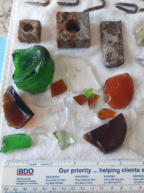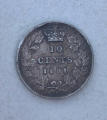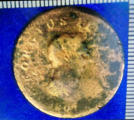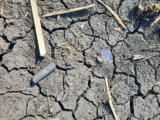
© 2025 Roger Fontaine, Designed by Bison Software

Metalman9
M
E
T
A
L
M
A
N
9


M
E
T
A
L
M
A
N
9


Ph: 204-223-7809
METALMAN9
Ph: 204-223-7809
METALMAN9
Click the date link, then a photo to start larger photo gallery & see descriptions

May 3, 2025 More of: One Mile North of Dufferin
May 3, 2025
More of: One Mile North of Dufferin
This
is
a
continuation
from
last
month’s
post.
See:
April
25
and 27, 2025
One Mile North of Dufferin.
This is now my third attempt at locating the potential remnants
of
the
1873
Surveyors
Camp.
“Moved
camp
to
within
one
mile
north
of
Dufferin”.
This
time
I
came
alone.
I
had
three
specific
locations
in
mind
where
I
really
wanted
to
metal
detect.
So
much
land
to
cover,
so
little
time.
Notice
the
word
“within”
in
the
Tuesday,
18
November,
1873
dairy
notation.
I
had
not
noticed
this
specific
word
before
now.
This
might
change
the
direction
of
my
quest.
This
is
definitely
going
to
be
a
long
term
project
but,
considering
how
“Clean”
of
metals
the
land
actually
is,
what
I
do
know
is
that
when
we
stumble
upon
the
campsite,
it
should
just
pop
right
up
at
us.
At
least
that’s
the
theory.
What
strikes
me
the
most
is
the
lack
of
square
nails. Very telling…
I
separated
the
find
from
today
into
3
different
piles
or
strips
on my display table. A, B, and, C.
The
finds
under
“A”
were
from
a
nicely
defined
ridge
that
runs
more
or
less
north
–
south
across
5
river
lots.
This
was
an
immediate
continuation
from
where
I
had
left
with
Randy
on
the
April
27
hunt.
Randy
and
I
detected
north
to
south
and
we
covered
a
fair
bit
of
ground.
This
continues
the
systematic
elimination
of
land
while
looking
for
a
possible
“Camp”
site
location.
Sounds
odd
to
say
but
we
now
know
where
the
camp
is
not.
Sounds
like
something
right
out
of
Sun
Tzu’s
Art
of
War
treatise.
It
is
a
process
of
elimination
while
covering
a
large area.
Of
the
two
round
metal
balls
found;
one
is
a
musket
ball
at
12.76
grams;
the
second
is
a
modern
ball
bearing,
magnetic
and rusted at 8.4 grams.
The
finds
under
“B”
were
right
next
to,
and
along,
where
the
Old
14
Hwy
runs
across
these
same
5
river
lots.
It’s
quite
a
ways
from
where
the
aforementioned
ridge
runs
but
I
thought
I’d
cut
to
the
chase
and
try
detecting
in
an
area
that
would
have
seen
a
lot
of
traffic
and
travelers
back
in
the
mid
to
late
1870’s.
It
proved
interesting
with
much
more
glass
and
some
ceramics
but
nothing
pointing
to
an
encampment.
I
also
noticed
how
heavily
wooded
the
local
area
is
and
if
this
were
the
case
back
in
1873,
I
rather
doubt
that
a
camp
would
be
set
up,
so
far
from
the
end
of
the
river
lots,
where
the
land
sections
begin
and
where
there
would
be
no
clear
line
of
sight
over
the
prairie.
Yes,
I’m
speculating
here
but
it’s
my
way
of
proving a theory.
The
finds
under
“C”
were
in
a
completely
different
area
and
is
most
improbable
as
a
surveyor’s
camp
but…
A
local
neighbor
whom
Monty
and
I
had
spoken
with
had
mentioned
to
us
that
we
would
find
a
lot
of
glass,
ceramics,
and
old
iron
items
on
the
land
near
or
in
the
bend
of
the
Red
River.
This
is
a
different
land
owner
but
he
was
kind
enough
to
grant
us
permission
and
access.
This
area
is
nestled
out
of
sight,
behind
a
large
grove
of
old
trees.
The
term
“An
English
Village”
was
used
in
describing
the
area
so
this
certainly
piqued
my
curiosity.
It
was
midafternoon
by
now
and
this
was
my
last
wide
sweep
at
metal
detecting.
It
proved
to
be
the
best
area
in
the
way
of
interesting
finds.
I
suspect
the
area
might
have
held
a
small
house
or
homestead
of
sorts
but
nothing
conclusive
as
to
whom
or
what
would
have
been
there
oh
so
long
ago.
It
was
not
the
surveyors
camp,
of
that
I
am
certain
but
future
outings
with
my
trusted
metal
detector
and
friends
should
reveal
yet
more
interesting
finds
and
perhaps some answers.
The
small
horse
shoe
is
either
for
a
mule
or
for
a
Shetland
pony;
your
guess
is
as
good
as
mine.
And
yes,
there
is
some
remnant
of
silver
on
what
would
have
been
a
serving
spoon.
Does that qualify as Treasure?
Also
of
interest
were
the
new
friends
that
I
found.
Metal
detecting
is
so
much
more
than
just
finding
metals;
it’s
a
journey
of
discovery.
The
last
pictures
are
of
a
Woolly
Bear
Caterpillar and of a Common Ground Beetle.
Roger
References:
https://en.wikipedia.org/wiki/The_Art_of_War
https://en.wikipedia.org/wiki/Pyrrharctia_isabella
https://extension.umn.edu/nuisance-insects/ground-beetles























May 10, 2025 An Invitation To Metal Detect
May 10, 2025
An Invitation To Metal Detect
I
was
at
a
formal
function
in
my
home
town
of
Letellier,
Manitoba
this
winter
when
I
was
approached
by
a
friend
from
my
late
teen
years:
Denis.
Denis
farms
near
Letellier,
as
his
family
has
for
generations.
He
also
happens
to
have
a
keen
interest
in
the
history
and
the
genealogy
of
his
own
family.
Denis
had
heard
of
my
metal
detecting
activities
in
the
local
area
so
he
asked
if
I’d
be
interested
in
metal
detecting
part
of
a
River
Lot
that
he
owns.
There
were
rumors
of
a
homestead
on
this
lot,
he
said,
a
house
or
something,
situated
close
to
the
Red
River.
Denis
had
been
finding
glass
and
ceramic
and
square
nails
in
a
specific
area
and
suspected
that
this
might
be
the
location
of
the
purported
homestead.
What
an
interesting
way
to
discover
new
things
about
one’s
family
history
than
through
the
finds
that
are
unearthed
through
metal detecting on a historical piece of land.
This
was
the
first
time
someone
other
than
my
own
family
had
asked
me
to
metal
detect
on
their
land.
I
must
say
that
this
is
much
easier
than
having
to
ask
for
the
required
and
highly
desired
Land
Owner’s
Permission.
I
worked
out
a
plan
with
him
as
far
as
the
exact
location,
time
frames,
number
of
people
detecting,
ownership
of
the
finds
etc.
Then
I
went
to
work…
I
obtained
an
aerial
photo
of
this
location
dated
May
17,
1930.
(See
the
first
Link
below).
I
also
forwarded
Denis
a
copy
of
the
Surveyor’s
Map
of
1873
and
did
as
much
research
as
I
could
and
coordinated
and
assembled
a
small
crew.
Denis
was
comfortable
with
four
detectorists
on
the
land
at
one
time.
The
four
of
us
were
able
to
fit
in
one
vehicle
and
with
four
detectorists,
we
were
also
able
to
cover
a
lot
more
ground
while
detecting.
We
were
Randy,
Robin,
Monty
and I.
May
10
was
a
perfect
weather
day.
Not
too
hot
and
not
too
cold
and
it
only
started
getting
overly
windy
by
midafternoon.
Sounds
like
Goldilocks
and
The
Three
Bears
story
Eh!
Every
one
of
us
came
up
with
excellent
artifacts
of
one
type
or
another.
This
location
was
truly
what
I
would
consider
virgin
ground
and
certainly
never
before
detected.
The
majority
of
the
finds
were
contained
to
the
area
closest
to
the
river
where
the
old
maps
showed
buildings.
The
finds
were
good
representations
of
an
early
settlement
and
some
items
were
truly interesting and odd.
Probably
the
strangest
find
had
to
be
a
“Waffled”
coin
or
medallion.
Monty
struck
the
JackPot
with
an
1807
British
Penny.
A
great
find
was
the
Snake
Buckle.
It’s
made
to
go
with the sword holster and is probably British.
The 4 shotgun shells are:
Purdey & Sons
No 12
London
No date found.
Rem - UNC
No 12
Remington
1915 - 1942
Eley
No 12
London
1896 – 1920
Kynoch
No 16
Black
1890 – 1918
There
is
also
a
wide
variety
of
fired
bullets
and
in
a
wide
range
of
calibers.
Some
of
the
.22
bullets
are
quite
mangled.
Other
notable
finds
are:
A
Customs
In-Bond
Seal.
On
the
6
buttons,
notice
the
delicate
pattern
on
the
last
two.
A
ruler
or
measuring
device
from
Rochester
N.Y.
and
a
wide
variety
of
hand
tools,
or
at
least
parts
of
them.
Of
interest
is
the
metric
ruler from L. O. Power Rochester N.Y.
Noted
were
the
large
blade
knife
and
a
folding
pocket
knife.
A
little
bit
of
wooden
handle
remains.
A
half
horseshoe
hopefully
brings
partial
luck.
I
can
see
two
small
horseshoe
nails
too.
The
last
thing
that
caught
my
eye
was
the
8
petal
Rose
shaped
disc.
I’m
guessing
it
was
part
of
a
horse
bridle.
It
is
made
from
copper
and
might
have
had
a
light
silver
patina over top.
Roger
References:
https://www.eodms-sgdot.nrcan-rncan.gc.ca/index-en.html
https://minterrornews.com/news-2-17-04-waffle_designs.html
https://cartridge-corner.com/shotgun2.htm


































May 24, 2025 Ground Finds
May 24, 2025
Ground Finds
It
was
one
of
those
outings
where
I’ve
got
all
of
my
gear
and
equipment
with
me.
My
detector’s
armed
with
a
14”
coil
for
maximum
ground
coverage
on
an
open
field
and
I
end
up
barely using it at all.
Many
farmers
today
use
a
land
husbandry
technique
called
“Direct
Seeding”
where
there
is
very
little
soil
disturbance
when
it
comes
to
seeding
and
working
the
land.
It
conserves
moisture
and
creates
a
more
“natural”
ground
condition
for
plants
to
grow
in.
Gone
are
the
days
of
deep
plowing.
All
that
to
say
that
I
found
digging
a
lot
harder
in
this
field
than
what
I’m
used
to.
Plus,
no
tillage
means
that
hard
items
like
glass,
iron,
ceramics
and
the
like
just
sit
on
the
surface
and
eventually
get
revealed
for
the
picking
when
it
rains.
Artifacts
just sit on top of the ground, hence: Ground Finds.
Today,
ground
finds
were
everywhere.
I’d
kneel
down
to
pick
up
two
or
three
pieces
of
glass
and
then
there
were
more
artifacts
to
be
seen
including
grommets,
carbon
pencils,
square
nails,
and
some
big
iron
too.
The
closer
to
the
ground
I
was,
the
more
I
saw.
Who
needs
an
expensive
metal
detector
when
all
you
have
to
do
is
look
around.
Also
found
were
a
broken
arrowhead
(unfortunately
broken)
and
a
pottery
sherd.
And
to
answer
that
burning
question
that
you’re
thinking
of…
Yes,
I
actually
do
hand
wash
and
brush
with
water
each
and
every
one
of
these
artifacts.
It’s
either
a
sign
of
madness
or
pure
dedication
to
preserving
history.
I
have
a
series
of
4
liter
glass
jars
full
of
these
glass
and
ceramic
pieces
in
my
office
at
home.
I
even
have
one
full
of
coal.
I
do
want
to
take
time
to
thank
and
to
say
hello
to
Garth
Hilderman
at
NCI
Radio.
Garth
made
reference
to
my
metal
detecting
on
the
radio
during
the
regular
Saturday
morning
Bingo
game.
Tess
and
I
met
him
at
an
aboriginal
function
last
year
where
I’d
left
him
my
business
card.
I
guess
I
now
have
one
more
follower
of
the
website.
Always
exciting
to
get
recognition:
Thanks
Garth,
this
one’s
for
you!!!
Under
the
“G”
Garth!
Some
of
the
regular
followers
may
have
noticed
that
I
haven’t
posted
as
much
and
the
posts
come
way
after
the
outing
is
done.
I’ve
been
taking
courses
at
the
U
of
M
and
it’s
been
taking
up
quite
a
bit
of
my
time.
I
am
presently
finishing
up
my
second
prerequisite
course
so
that
I
can
take
a
Creative
Writing
course
or
two.
This
way,
I
can
write
stories
for
you
that
are
even
better.
Here’s
a
fun
fact….
Heads
up…
If
you’re
a
resident
of
Manitoba
and
65
years
old
or
more,
your
University
education
is
free.
You
need
to
be
admitted
by
the
university
of
course
but
in
my
case,
as
alumni,
they
simply
dredged
up
my
old
Student
number
from
42
years
ago,
now
there’s
a
relic,
and
here
I
am
back
in
school.
You’re
never
too
old to learn new things.
Here
are
a
series
of
pictures
from
my
“Walk”
in
the
field.
Yes,
all
that
glass
and
ceramic
was
just
sitting
there
for
the
picking.
This
area
has
a
lot
of
history
and
is
always
a
great
place
to
go
metal
detecting.
See:
May
11,
2024
-
The
Group
Hunt and the Finds.
Roger
























May 31, 2025 The Ridge in Spring
May 31, 2025
The Ridge in Spring
In
my
last
post
on
May
24,
2025,
I
found
a
lot
of
ground
finds
but
did
very
little
in
the
way
of
actual
metal
detecting.
Today
it
was
back
to
basics:
Metal
Detecting.
I
wanted
to
go
over
the
Surveyor’s
Camp
Site
of
1873
at
least
one
more
time
this
year
before
the
crop
completely
takes
over
the
field.
There
had
been
very
little
soil
disturbance
on
this
field
since
last
fall
so
ground
finds
should
also
come
easy.
The
corn
crop
had
gone
in
using
“Direct
Seeding”,
a
method
that
provides
minimal
soil
disturbance.
I
had
a
short
window
of
opportunity
to further explore and detect on site.
The
main
references
to
the
site
are:
September
25,
2024
-
The Ridge
and
at:
October
24,
2024
-
Returning
to
the
Ridge.
A
Continuation
Knowing
exactly
where
in
the
field
the
old
camp
site
was
located,
I
quickly
found
the
debris
field
on
the
ridge
and
began metal detecting. Sure enough, I began to locate iron.
Let’s
see
what
the
winter’s
frost
pulled
out
of
the
soil
or
brought close to the surface.
The
more
telling
finds
are
the
two
partial
horseshoe
nails.
Yes,
all
survey
work,
the
getting
around
and
the
occasional
travel
back
to
Winnipeg
was
all
done
on
horseback.
Life
back
in
the
day
was
not
all
milk
and
honey.
In
fact,
on
Thursday,
August
21,
1873
…
Horse
lost
across
the
river,
sent
the
men
to
search
for
him,
two
men
remain
at
camp
to
make
posts.
Friday,
August
22,
1873
…part
of
the
men
searching
for
horse.
Saturday,
August
22,
1873
…Found
the
horse.
Also
found
that
might
pertain
to
the
surveyors
were
two
grommets
that
probably
formed
a
part
of
the
horse
tack.
The
shotgun
shell
bottom
is
iron
and
is
too
corroded
to
make
out
any
markings
thus
impossible
to
date
accurately.
The
small
1
-
1/4
inch
square
nails
were
for
supply
crates.
Most
of
the
square
nails
are
only
found
in
the
debris
field
as
there
are
very few anywhere else in this farm field overall.
My
last
question
is
what
antique
farm
machinery
was
painted
blue.
In
the
last
picture,
there
is
still
some
blue
paint
left
on
two
artifacts.
These
items
came
much
later
than
1873
but
are
not
recent
either.
More
finds
to
come
from
the
ridge
next
spring as the corn will not come off until very late in the fall.
Roger



































